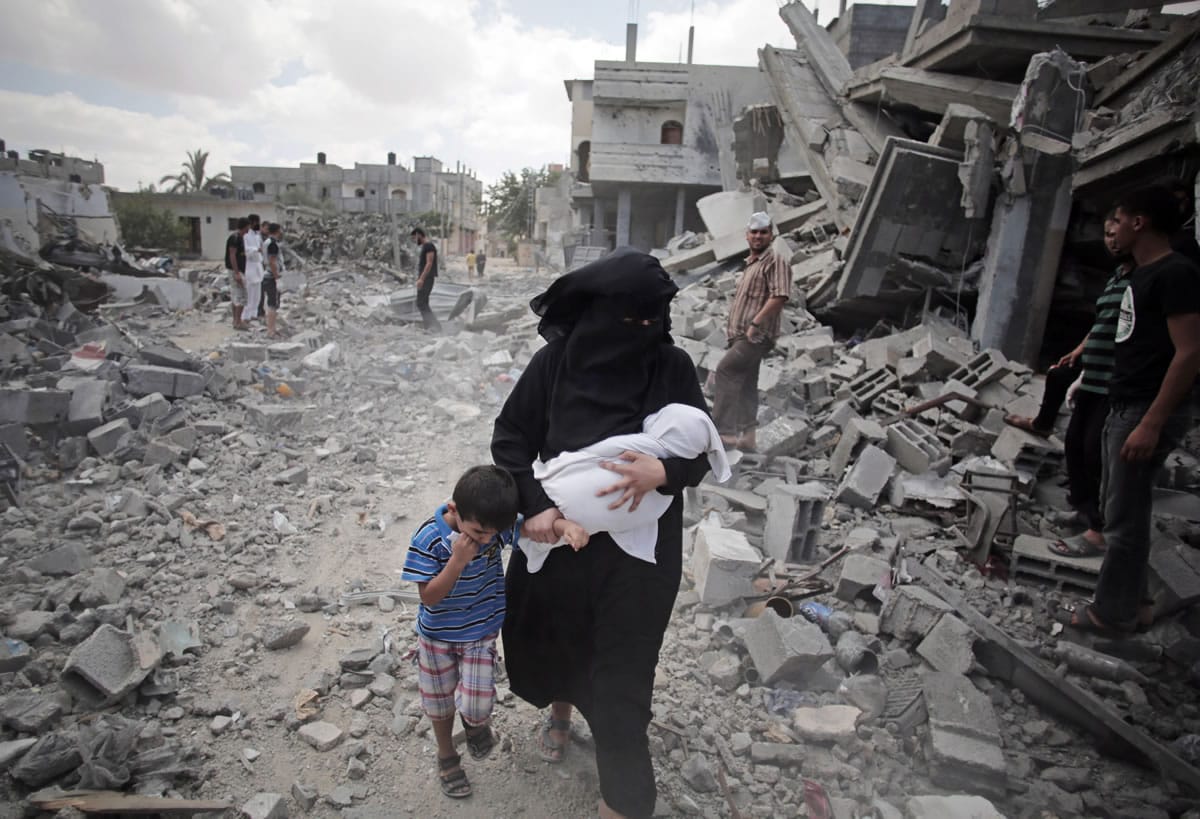RAFAH, Gaza Strip — The first of August dawned as a day of promise for the Mahmoum clan and thousands of other Palestinians stuck in United Nations shelters in Rafah — thanks to a temporary cease-fire with Israel they could go home for three days.
But the expected respite quickly turned into one of the deadliest and most controversial episodes in the recent war between Israel and Hamas in the Gaza Strip. After just two hours, amid fear that Hamas had captured an Israeli soldier, the Israeli military sealed off the Rafah area and began shelling. By the end of the next day, 190 Palestinians were dead, according to a list of names compiled by two Gaza human rights groups, including 14 members of the Mahmoum family.
The Rafah operation is almost certain to be a focus of U.N. investigators and rights groups looking into possible war crimes because it highlights a key concern: The treatment of civilians.
A Palestinian rights group argues that the Israeli army violated the rules of war, which include giving adequate warning to civilians, using proportionate force and distinguishing between civilians and combatants. Unlike in many other Gaza battles, civilians were caught by surprise by the sudden fire and sealed exits.
“None of the rules of international humanitarian law was observed,” said Mahmoud Abu Rahma of the Al Mezan rights group.
The Israeli military confirmed that Rafah residents were barred from leaving the area on Aug. 1, but declined comment on the war crime allegations. It denied firing into a densely populated area without regard for civilians, saying precise airstrikes hit targets linked to militants and artillery — though inherently inaccurate — was only aimed at open fields.
Late on Aug. 2, the suspected capture of the soldier turned out to be a false alarm, and the Rafah episode is one of several under internal military review.
“If we accidentally or mistakenly targeted a civilian situation, it was a mistake, and we are very sorry about that,” an officer from the army’s Southern Command said on condition of anonymity as he wasn’t authorized to speak on the record.
The following account is from interviews with Palestinian survivors and the Israeli military, along with events witnessed by The Associated Press.
o o o
The cease-fire took effect at 8 a.m. Friday. Mustafa Mahmoum, a municipal bulldozer operator, was at work clearing rubble from previous Israeli strikes. But after weeks in a shelter, his wife Iqzayer, 34, and their seven children returned to the family home in Tannour in east Rafah, about 2 miles (3 kilometers) from the Israeli border.
A few houses down Ouroba Street, the main thoroughfare, Azizeh, 47, the wife of one of Mustafa’s cousins, and her nine children also moved back home into their two-room shack with a roof of corrugated metal.
At 9 a.m., the commander of Israel’s Givati Brigade, Col. Ofer Winter, had just dozed off after a sleepless four dead children. He found them near the Bilbesi supermarket amid the debris.
“It was hard,” he said, struggling to keep his composure.
The heavy Israeli fire continued Saturday, including airstrikes on homes that killed several dozen people, according to the Gaza-based Palestinian Center for Human Rights.
By late that day, it had become clear that Goldin, the 23-year-old soldier, had been not captured but killed in a firefight. After forensic analysis of remains found in the tunnel, he was declared dead.
It was not until Sunday that some bodies on Ouroba Street could be retrieved.
“It was a horrible scene,” said Ghassan Bilbesi, son of the supermarket owner. “People had lost their hands, their arms.”
Mustafa’s wife and children were buried on Monday, Aug. 4, in the sandy soil of a new cemetery on the edge of Rafah, in a row of 14 still unmarked, cinder block-lined graves. Hamad has no idea where her son’s remains lie.
o o o
In all, 121 Palestinians were killed in Rafah on Aug. 1 and 69 on Aug. 2, according to the Palestinian Center for Human Rights and Al Mezan rights group, which compiled the names. The dead included 55 children, 36 women and five men over the age of 60.
In the Tannour and adjacent Jneineh neighborhoods alone, 37 people were killed on Aug. 1, the rights groups say. The Mahmoum clan lost seven children, six women and a young man.
The losses played into a bigger debate over the uneven death toll in the war. More than 2,140 Palestinians were killed, three-fourths civilians, according to the U.N. On the Israeli side, 72 people were killed, all but six soldiers.
Israel said it warned civilians to leave targeted areas through automated calls and leaflets, and accused Hamas of putting civilians at risk by using them as human shields in crowded neighborhoods. The military said the events in Rafah, along with others, are under review by officers who were not part of the chain of command. The conclusion will be handed to the army’s advocate general.
Even if the findings of U.N. investigators are months away, Mustafa Mahmoum is determined to demand justice for his family and trial for Israeli officials who ordered the Rafah attack. Trying to rescue a soldier does not justify killing civilians, he said.
“Even in war,” he said, “children are protected.”



